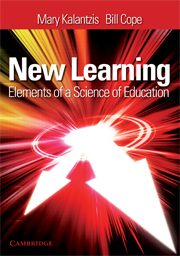1 - New Learning
from Part A - Introduction – Changing Education
Summary
Overview
In this chapter, we reflect upon this peculiar moment in the profession of education. Certainly, education seems more important than ever before. Politicians talk about the knowledge society; business people discuss the new economy; and parents worry about the role a good education will play in their children's futures. Despite this, educators struggle to find the resources to meet increasing expectations.
What is this thing, ‘education’, that is expected to do so much? In its most visible manifestation it consists of institutions – schools, colleges and universities. Education is also a social process, the relationship of teaching and learning, where one person helps another to learn. As a professional practice, it is a discipline. As a body of knowledge and way of knowing the world, it is a science.
Education in all its aspects is in a moment of change, or transition. The idea of ‘New Learning’ contrasts what education has been like in the past, with the changes we are experiencing today, with an imaginative view of the possible features of learning environments in the near future. What will learning be like, and what will teachers' jobs be like?
Being an educator in ‘interesting times’
These are strange times for education – or, in the words of the often-quoted Chinese saying, ‘interesting times’.
On the one hand, we are told on an almost daily basis that education is of paramount importance. It was always important, but somehow, today, it is more important than ever.
- Type
- Chapter
- Information
- New LearningElements of a Science of Education, pp. 3 - 16Publisher: Cambridge University PressPrint publication year: 2008



